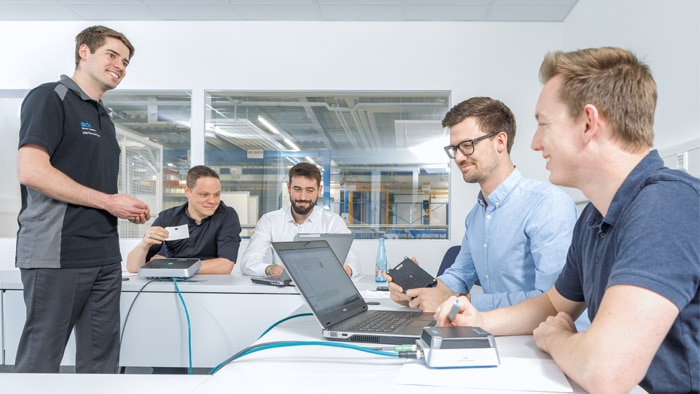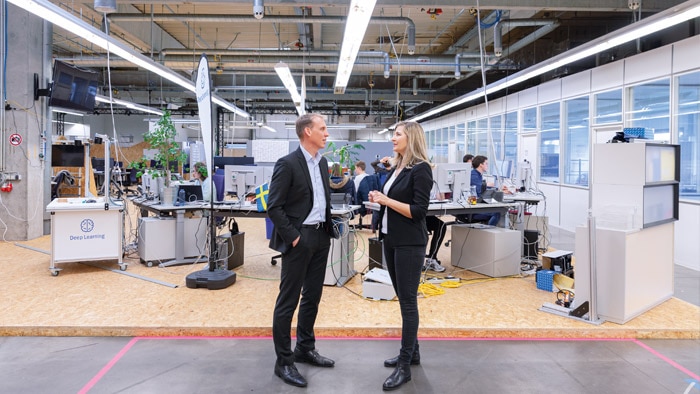The Fourth Industrial Revolution. Digital transformation. These are daunting words for some companies. It's no wonder that a few of them are still holding back on acting. With its new learning modules on the topic of Industry 4.0, SICK is supporting its customers in building up the necessary competency and know-how in this area, and enabling them to achieve quick benefits with only a little effort. Especially in these times, it is evident how much digitization has already found entry in our lives and is making possible ways that were unthinkable just years ago. Even in digital learning.
New learning offerings about industrial digitization
Marcus Neubronner, Head of Sensor Intelligence Academy, and Bernhard Müller, Senior Vice President Industry 4.0, are standing in the Start-up Arena, a former production hall of SICK AG in Waldkirch. Next door sensors are still being built and tested – here, however, is where new ideas are being created. There are posters hanging everywhere showing what the teams are working on. Chipboard sheets dominate the scene. Among the couch, desk and background noise, they and 14 others commenced the first start-up customer training session two years ago. Marcus Neubronner fetches a few pillows, carefully lays them out on the wooden arena and begins: “We currently find ourselves in a dynamic period. We are exploring many exciting topics to do with digitalization and Industry 4.0 that will change the way we work in future. And this affects not only us as a company, but also our customers”, says Neubronner. “Internally, we need to build up new competencies in order to develop our digital business model. But we must not forget our customers while doing so. We want to pick them up and accompany them in their digital transformation.”
Study: lifelong learning gaining in importance
This has also been underscored by the new 2020 Industry 4.0 study: “The Fourth Industrial Revolution. At the intersection of readiness and responsibility” from the Deloitte consulting firm. In this study, around 2,000 C level managers from 19 countries where surveyed, amongst other things, on the topic of skills for Industry 4.0. 74% of the CXOs regard lifelong learning, and the associated advancement and further training of employees, as increasingly important and the highest priority for investment. 59% are willing to invest in order to gain a better understanding of what skills will be required within their company in future for Industry 4.0.
Structured approach for getting to Industry 4.0
Industry 4.0 is a topic that can no longer be avoided, says Bernhard Müller also: “We are currently finding that significantly more companies are addressing this issue. Many have understood that something is going to happen. They just may not grasp yet exactly what.” This is also confirmed by the 2020 Industry 4.0 study: Only 10 percent of the people surveyed worldwide indicated that their company is pursuing a comprehensive Industry 4.0 strategy. Two thirds of the global companies currently either have no defined Industry 4.0 strategy (21%), or are adopting an ad-hoc approach only (47%). Müller nevertheless recommends a structured approach. “If we want to further digitize processes and structures, we all need to change our behavior and our way of working. This hurdle seems insurmountable at present, but we need to overcome it to continue to stay ahead of the pack.”
The Fourth Industrial Revolution. Digital transformation. Big words but no clear picture of where companies are heading. One thing is clear, however: it is going to be dynamic and complex. And this complexity will still cause some companies to hesitate. “To be entrepreneurial, you need something that will give you an immediate advantage – and with little effort and cost”, says Müller. “Industry 4.0 also offers the much-discussed “low hanging fruits”. To harvest them, however, requires a new way of thinking and new tools”, adds Müller.
New offerings and a Demonstration Factory in Aachen
Marcus Neubronner and his team can help with this: “We are currently developing for our customers a training offering to assist them in building up their competency and know-how in the area of Industry 4.0. This training combines content with a variety of didactic methods. For example the web-based “Integration Solution Basics” foundation course that is offered for employees and customers. It consists of a total of 5 modules. One of them can also be tried out as a taster course through a free guest access. But this is only a part of the large and constantly expanding offer. In addition, there are a large number of webinars from a wide range of disciplines, and Neubronner also recommends taking a look beyond the borders of one's own country and taking a look at the offerings of various SICK country representatives. "After all, our digital learning opportunities are almost limitless," says Neubronner with a smile.
A good keyword also for the Demonstration Factory in Aachen. Industry 4.0 is already being lived here. Together with well-known partners, SICK is involved on the campus of RWTH Aachen University to demonstrate how the concept of the networked value-added chain can already be transferred to small, medium-sized and large companies today. Application examples, so-called use cases, will be used to demonstrate how easy it will be to enter the networked production of the future.





